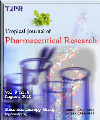
|
Tropical Journal of Pharmaceutical Research
Pharmacotherapy Group, Faculty of Pharmacy, University of Benin, Benin City, Nigeria
ISSN: 1596-5996
EISSN: 1596-5996
Vol. 7, No. 4, 2008, pp. 1169-1177
|
 Bioline Code: pr08040
Bioline Code: pr08040
Full paper language: English
Document type: Research Article
Document available free of charge
|
|
|
Tropical Journal of Pharmaceutical Research, Vol. 7, No. 4, 2008, pp. 1169-1177
| en |
Aspects of microbial quality of some milk products in Abuja, Nigeria
Okpalugo, J; Ibrahim, K; Izebe, KS & Inyang, US
Abstract
Purpose:
To assess the microbiological quality of some milk products in Abuja, Nigeria capital city; and the resistance of isolates to some broad spectrum antibiotics.
Method:
Three packs of different brands of yoghurt and pasteurized milk purchased from four different locations were assessed in duplicate. Isolates were identified using growth on agar and broth, Gram's reaction, colony morphology, biochemical tests results and criteria for disregarding negative cultures. Resistance of isolates from pasteurized milk was determined using the antibiotic sensitivity test (zones of inhibition).
Results:
33 bacterial and 12 fungal isolates belonging to 9 and 3 genera respectively were identified from the yoghurt samples. Presence of yeast was found to increase the microbial load of bacterial groups and decrease the load of live and active cultures which was absent in 33% of yoghurt samples. 27% of samples were heat-treated and contained no LAC. A total of 19 bacterial isolates belonging to 6 genera were identified from the pasteurized milk samples. Milk quality based on methylene blue decolourization time measurement revealed that 49% of the assessed samples were of excellent quality, 37% of good quality, 14% of fair quality, and 0% of poor quality. No milk sample was sterile. Among the three antibiotics tested for resistance on the isolated bacterial strains, three different resistance patterns were observed.
Conclusion:
Our study shows that mesophilic yeast was the main cause of yoghurt spoilage. Sampled yoghurt is unlikely to make a vital input to LAC intake in Nigerian diets and poses some yet undefined risk. Visual inspection of packages, quality assessment of diary plants/vessels and packaging materials, dye reduction tests, refrigeration at all times, and resistance testing should be critically considered before the use of recommended antibiotics.
Keywords
Pasteurized milk, Yoghurt, Live and active cultures (LAC), Dye reduction tests, Antibiotics, Spoilage organisms, Bacterial resistance pattern.
|
| |
© Copyright 2008 - TJPR Faculty of Pharmacy, University of Benin, Benin City, Nigeria
Alternative site location: http://www.tjpr.org
|
|
